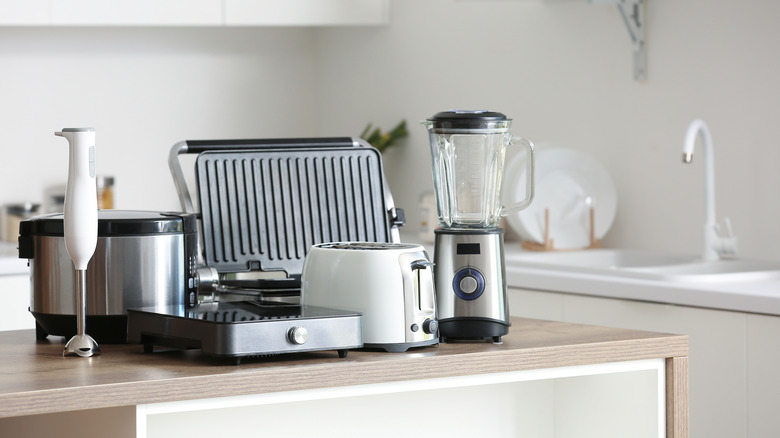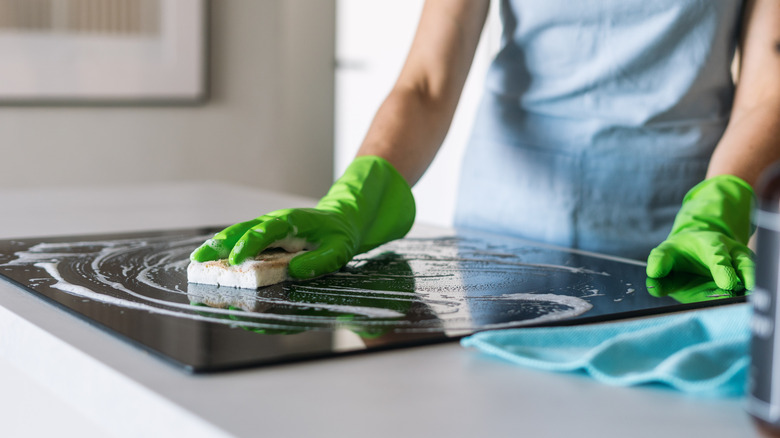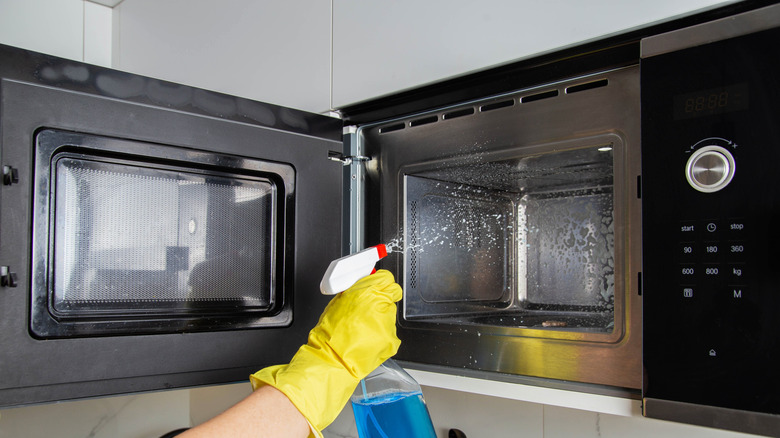Your Kitchen Appliances Aren't Running Properly Because You're Neglecting This Simple Action
I have nothing but respect for people with immaculate kitchens. I'm on the messier side by nature. But I'm making progress. It may seem obvious, but it's taken me a while to really learn that small acts of regular maintenance save a lot of effort in the long run.
We all understand why festering food debris is a health hazard. But a little grime never hurt anyone, right? Well, no. Every day grime probably won't hurt you — but it may hurt your appliances. Just a simple wipe-down on a regular basis can have a big impact. Try to clean your appliances every day, or at least a few times per week. I'm not talking about daily deep cleans here. A quick pass with a damp, slightly soapy Swedish dishcloth can go a long way to preserving your appliances.
Cleaning your appliances regularly can extend their lifetime and keep them functioning efficiently. Regular wipe-downs aren't just about keeping your kitchen looking clean; you'll have lower energy bills and won't have to search for a new toaster oven every Black Friday. But why do clean appliances work better than grimy ones? And how often do you really need to be cleaning up?
Why do clean appliances work better?
Dirt, dust, and grime can mess with your appliances in a number of ways. Crumbs and crust can keep the seals on your oven or refrigerator from doing their job and let hot air out (or in). Spills can prevent sensors from, well, sensing what they need to sense. And debris can clog vents and block airflow, causing appliances to overheat.
Coffee makers, electric kettles, and other appliances that use water need regular descaling. Descaling removes limescale — a powdery white mineral buildup that collects around faucets and water reservoirs, and which can clog pipes or tubes. If left too long, it can even corrode metal. Follow your manual's instructions to descale limescale-encrusted appliances.
Crud and crumbs are downright dangerous for appliances with exposed heating elements. Spills can end up baked on burners if you're not careful, and that's the best-case scenario. Worst-case scenario, the food could catch on fire.
When you're cleaning appliances, make sure to use the correct cleaning solution for the job. Vinegar is a fantastic, eco-friendly cleaner with a multitude of applications — but it also has its limitations. It isn't always safe to use vinegar to descale complex coffee makers or clean stainless steel appliances. Vinegar's ultra-acidic nature can break down protective coatings or degrade delicate plastic parts. It's not a great option for your dishwasher, either. Instead, use a specially-formulated rinse aid for every load. It'll make your dishes sparkle and keep the inner workings clean.
How often should you clean your appliances?
For small countertop appliances, try to integrate cleaning into your daily routine. You should be wiping your counter every day; it shouldn't be too much trouble to run a damp sponge over your electric kettle while you're at it. But what about appliances that need more than a simple wipe?
I'm not going to tell you that you need to use oven cleaner every week or deep-clean your fridge every day. Still, you should collect crumbs, wipe up spills as soon as they happen, and check your fridge for festering food every week. For some appliances, your cleaning schedule will depend on use. Some people use microwaves more than others; luckily for frozen food aficionados, there are many ways to clean your microwave. You should descale kettles and coffee makers at least once every six months, but you may need to descale more often. Some appliances may require monthly descaling, so check your manual.
Try to clean your cooktop after every use. Folks with a glass cooktop can get away with a quick wipe once the burners are cool, but it's a little harder for those of us with grates or drip pans. I remove my stove's drip pans and clean them while doing dinner dishes.
I know, it's a hassle. You don't need another responsibility. But integrating quick cleans into your routine can save a lot of time and money down the line — and isn't that worth a few extra minutes per day?


